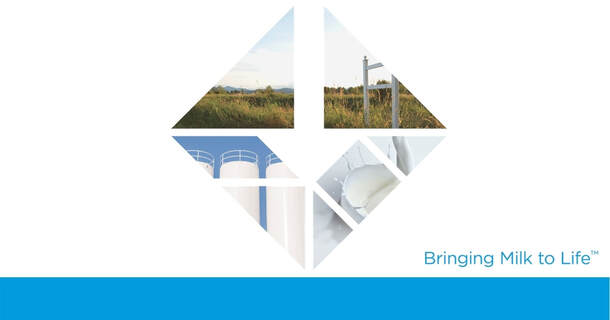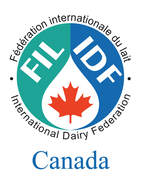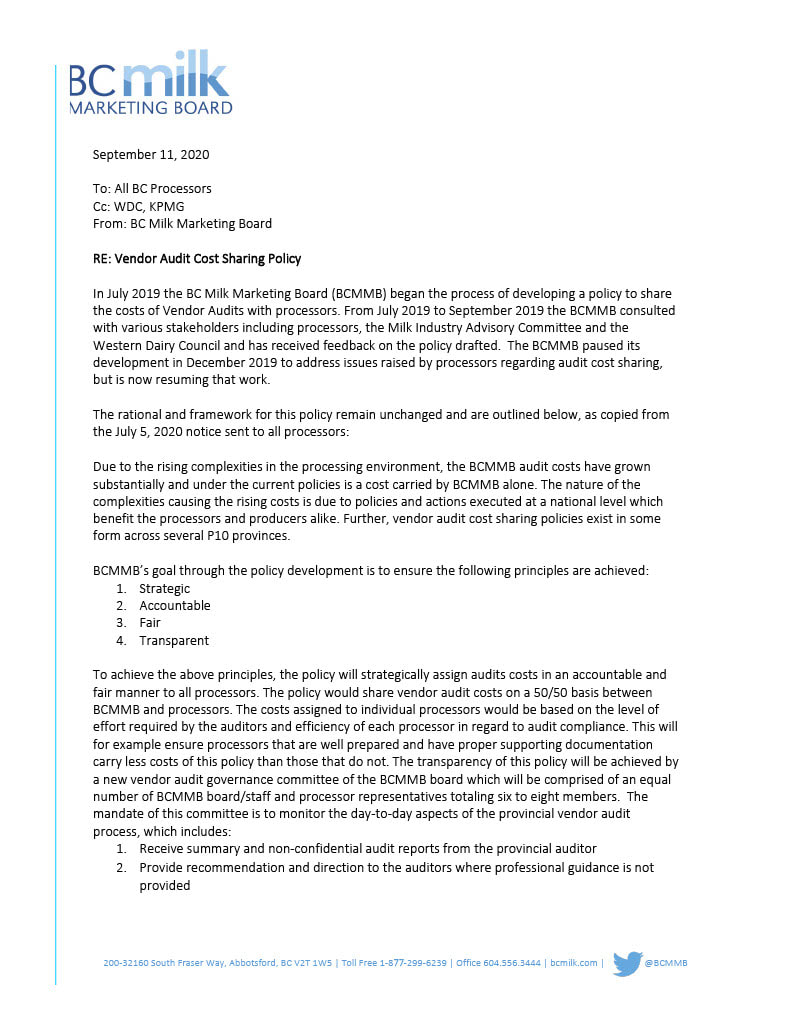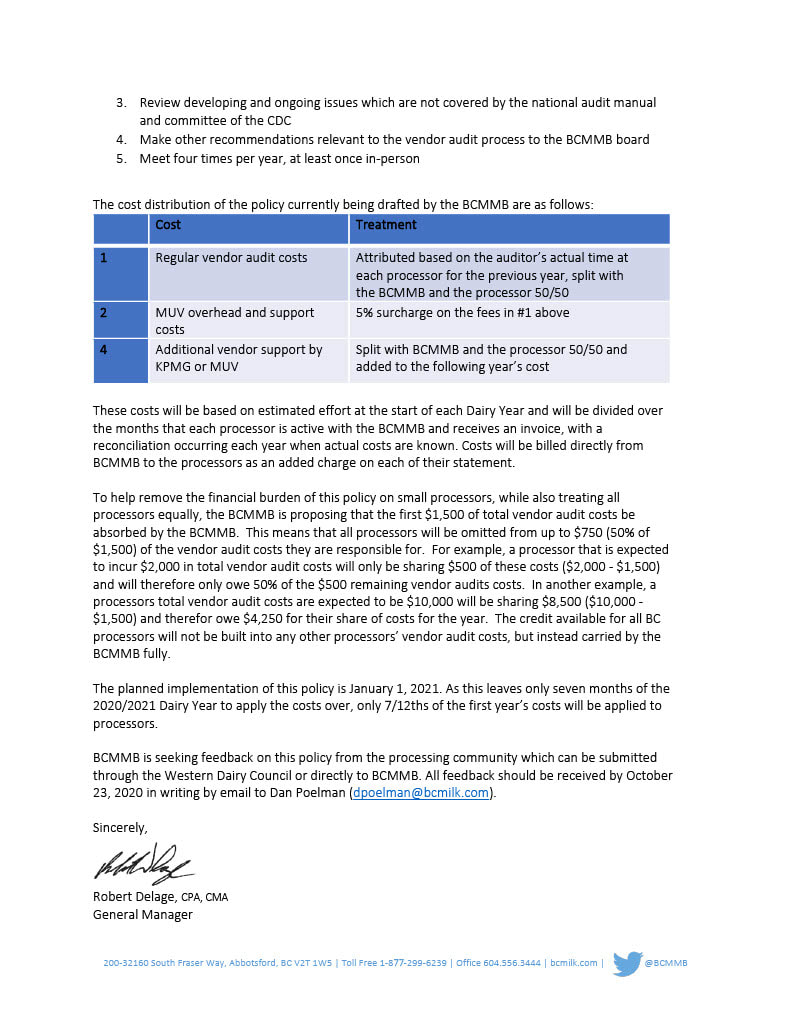|
Dan Wong
President, Western Dairy Council These are trying times. That might be the biggest understatement of the past two years as the dairy industry in western Canada -- like all sectors of the economy -- wrestles with a host of unprecedented challenges ranging from drought to floods, to supply interruptions to, most recently, the effects of the Omicron variant of COVID-19. The cumulative effect of these challenges has been to create unprecedented disruptions throughout supply chains for many consumer goods. It’s not the way any of us had hoped to start the New Year. Recently, we’ve heard reports of dairy product shortages and “out-of-stocks” at some grocery stores, not just in British Columbia or western Canada, but across the entire country. This is an obvious source of concern as everyone involved in the Canadian dairy industry -- including farmers, their input suppliers, transporters, processors, service providers, distributors and grocery stores -- is dedicated to ensuring that consumers have ready access to the dairy products they want and need, all the time. When we hear about empty store shelves, the natural reaction is to ask, “where’s the bottleneck?” The answer is that depending upon the product, the geographic location and the specific circumstances in a given day or week, it can be anywhere, or in several places, throughout the supply chain. Equipment and supplies are held up at ports. Truck transport is slowed by a shortage of drivers and, as we’ve seen in BC over the past two months, by highways that have been battered and destroyed by once-in-a-lifetime floods. Even more recently, we’ve seen the Omicron variant take a toll on all segments of the supply chain. The impact of Omicron can’t be underestimated. Food & Beverage Canada recently reported that food processors are experiencing about 30% absenteeism, presumably reflecting the pervasiveness of Omicron. Earlier in January, the Retail Council of Canada reported absenteeism of up to 20% at retail stores, including grocery stores. In addition, there are reports that restaurants have had to curtail their hours of operation because of staff shortages owing to COVID-19. And yet, it’s not just Omicron, but the accumulation of all these factors that has caused disruptions in the supply chain. Producers have faced feed shortages as a result of severe weather and transportation challenges. Processors have experienced slowdowns in the delivery of packaging and other supplies. Transport companies, faced with shortages of qualified drivers and vehicles, a situation that pre-dated the pandemic, are now faced with longer hauling times as a result of traffic restrictions on damaged highways. In addition, grocery retailers, on the receiving end of these accumulated delays, are not immune to staff shortages related to the Omicron variant and may take a bit longer to get shelves re-stocked. WDC’s members have also felt the impact of these disruptions. COVID-19-related absenteeism has affected us too, as have delays in the delivery of supplies and, at the peak of the flood catastrophe in BC’s Fraser Valley, regional access to the milk supply. Yet the prevailing feedback from our members is that, while operations and distribution may be affected in certain cases, they are still getting products to market. Aside from the occasional weather delay (it being January), the dairy processing sector in western Canada is functioning well and customer orders are being filled. Of course, none of this would be possible without the exceptional efforts put forward by the dairy farmers and staff at the Milk Marketing Boards who have worked tirelessly to keep milk flowing (even in British Columbia, where production has been restored after one of the most incredible environmental disasters in the province’s history). Despite the challenges, all segments of the dairy supply chain are doing everything they can, in unprecedented circumstances, to ensure that high quality dairy products are available to consumers in all regions of the country. We are not alone in this. Other agri-food sectors are also managing supply chain disruptions, as are industries as diverse as automobiles, electronics and building supplies. Some economists expect supply chain issues to persist for the remainder of the year. It will be a challenge, but we can expect the dairy industry to come through, as it always has. On January 4, 2022 the CUSMA Dispute Settlement Panel published its report on Canada’s administration of its dairy tariff rate quota (TRQ). At the centre of the dispute is how Canada has allocated its TRQs – the quantities of dairy products such as milks, cheeses, powders, yogurt and ice cream that can be imported at lower duty levels under the terms of CUSMA.
The report finds on the one hand that "Canada’s practice of reserving TRQ pools exclusively for the use of processors is inconsistent with Canada’s commitment in Article 3.A.2.11(b) of the Treaty not to “limit access to an allocation to processors.” On the other hand, the report finds that “nothing in the panel’s ruling constrains Canada’s discretion to administer its TRQ however it wants, within the treaty’s set limits. Quite the contrary – Canada has significant discretion in designing and implementing its allocation mechanisms.” And further, “The Panel agrees with Canada that the design of an allocation mechanism, including who may obtain an allocation, is left up to the discretion of the importing Party, in this case Canada, to determine, subject to consistency with the other provisions of the Agreement.” Reaction to the decision has been mixed, with both countries claiming victory. U.S. Trade Representative Katherine Tai proclaimed that “This historic win will help eliminate unjustified trade restrictions on American dairy products, and will ensure that the U.S. dairy industry and its workers get the full benefit of the USMCA (as it is known in the United States) to market and sell U.S. products to Canadian consumers.” For Canada’s part, International Trade Minister Mary Ng and Agriculture and Agri-food Minister Marie-Claude Bibeau declared that “We are pleased with the dispute settlement panel’s report, which ruled overwhelmingly in favour of Canada and its dairy industry. In particular, it is important to note that the panel expressly recognizes the legitimacy of Canada’s supply management system. The panel also confirms that Canada has the discretion to manage its TRQ allocation policies under CUSMA in a manner that supports Canada’s supply management system.” Canada now has until February 3 to propose the measures it will take to comply with the CUSMA panel’s decision. The federal government has indicated that it will work with the industry to ensure that its TRQ allocation mechanism satisfies the panel’s decision. The final panel report is available here. On November 18, 2021, in response to extreme weather events in the southwestern region of the province and the Fraser Valley in particular, the Government of British Columbia declared a provincial state of emergency to mitigate the impacts on transportation networks and the movement of essential goods and supplies, including raw milk and finished dairy products.
All WDC members in British Columbia and several outside the province have been directly affected by the events and resulting disruptions to the dairy supply chain. The Fraser Valley accounts for three-quarters of British Columbia’s milk supply and is home to several major processing plants. The disastrous flooding of more than sixty dairy farms and the closing of all access routes into and out of the region has inhibited the supply of milk to processing plants throughout the Lower Mainland. The Western Dairy Council is working closely with the BC Milk Marketing Board, the BC Dairy Association, the Canadian Dairy Commission and the Dairy Processors Association of Canada along with all federal, provincial and local government authorities to respond quickly and effectively to supply chain disruptions resulting from these events. As always, our primary interest to make sure consumers have ready access to fresh dairy products wherever they are located. We applaud and support the efforts of everyone in the dairy industry, in government and in the local communities to restore the supply chains and get products to market as quickly as possible despite the circumstances. The Western Dairy Council and its members were shocked and dismayed by recently-released video footage showing disturbing incidents of animal abuse at a Fraser Valley dairy farm. Our members do not condone the mistreatment of animals at any farm under any circumstances and appreciated the swift action taken by the BC Milk Marketing Board (BCMMB) to suspend the farm’s license, pending investigation, upon learning of the incidents.
Since that time, we have been kept apprised of BCMMB’s investigation and the resulting Corrective Action Plan that it has set as a requirement to reintegrate the farm’s milk back into the supply. We understand that BCMMB’s decision to reinstate the farm’s license is conditional on the full implementation of the Corrective Action Plan. We expect that BCMMB will ensure that all provisions of the plan, including requirements for continuous external oversight and frequent, unannounced inspections, will be completely adhered to at all times. The 2021 Annual Meeting of the Western Dairy Council will be held on Thursday, July 22, 2021 from 9:00 am – 9:30 am (Pacific).
As required by the Canada Not-for-Profit Corporations Act, the meeting will transact the following business:
This year’s Annual Meeting will again be conducted by videoconference. WDC members seeking more information or wishing to confirm their attendance may do so by emailing [email protected]. June 29, 2021
(OTTAWA, ON) – The Dairy Processors Association of Canada has joined others in Canada’s dairy sector to ask Federal, Provincial and Territorial (FPT) Ministers of Agriculture to implement mandatory and enforceable provincial Grocery Codes of Conduct, supported by a federal framework, to address current issues within Canada’s grocery retailer-supplier relationship. With a letter sent on June 28, the dairy sector joins numerous other farming and processing groups across the country in making this request. This request comes as a Working Group established by FPT Ministers of Agriculture completes its report on the relationships between Canada’s retailers and suppliers. The work of the FPT Working Group was welcomed by farming and food processing groups that called for action on retailers’ use of arbitrary fees and deductions and lack of adherence to terms of contracts. The dairy sector believes that the current environment whereby retailers hold significant market power has limited investment in Canada’s agri-food sector and instills a culture of distrust between retailers and suppliers, which ultimately hurts consumers. The signatories have asked the FPT Working Group to consider the positive impacts of mandatory codes, such as that of the United Kingdom, have had in reversing this trend. Thus, the sector believes that mandatory codes are the only way to restore fairness and balance in Canada’s food supply, for the benefit of the entire value chain, from farm to fork. Full letter: Letter – FPT Working Group (28-06-2021) The New Normal Heading into the fall, it appears as if the impacts of the COVID-19 pandemic will be with us for some time. Nevertheless, the dairy processing industry in western Canada continues to adapt and respond with increasing emphasis on business recovery. The Western Milk Pool marketing boards report that the supply situation is now at a “steady state” with only occasional skimming and no recent milk disposal. Processor orders are being fulfilled and some interprovincial milk movement is taking place to maintain stability of supply. After experiencing a lot of volatility in the first few months, retail demand seems to have stabilized but the food service market is still slow to recover. In British Columbia, the Western Dairy Council joined the BC Dairy Association and the BC Restaurant and Food Service Association in asking the Minister of Agriculture to support joint marketing initiatives to boost local restaurant sales. What that support might look like is now up in the air following the Province’s decision to go to the polls on October 24. In response to the current situation, WDC members elevated health and safety protocols at their facilities throughout the summer. In August WDC surveyed its Board members and found near-universal face mask requirements and measures to facilitate social distancing at their plants. Most have contact tracing protocols and some have introduced temperature testing for employees and visitors. Despite the long road ahead, the industry is taking a proactive approach to implementation of, and compliance with, the aforementioned protocols. We recognize the hard work that goes into providing fresh, nutritious food for our communities and we want to thank our members for being conscientious in protecting their employees, service providers and supply chain partners by enhancing safety measures and putting these protocols in place. US Expresses Concerns in the First 60 Days of CUSMA The Canada-US-Mexico Agreement (CUSMA) came into effect on July 1, 2020 and already the United States has started to voice concerns about its partners’ fidelity to the new trade agreement. On August 13, 114 members of the House of Representatives penned a letter to US Trade Representative Robert Lighthizer and Secretary of Agriculture Sonny Perdue urging swift use of the agreement’s consultation and enforcement measures to “ensur(e) faithful implementation of its provisions by our trading partners.” In particular, Canada’s administration of Tariff Rate Quotas (TRQs) and measures to eliminate Classes 6 and 7 were identified as elements of the agreement that demanded attention, as were Mexico’s commitments pertaining to commonly used cheese terms. On August 25, twenty-five US Senators signed a similar letter to the USTR and the Secretary of Agriculture. Provincial Milk Boards Consider Audit Cost-Sharing Options Milk utilization audits are an essential part of the administration of the dairy industry’s supply management system. How the industry pays for milk utilization audits in each province has been deliberated for many years. Over the past year, discussions have taken place between the Western Dairy Council and Alberta Milk on ways of updating the province’s decades-old cost sharing agreement between producers and processors. And this summer, the BC Milk Marketing Board presented a proposal to share audit costs with processors in BC. The BC proposal can be viewed at www.westerndairycouncil.com/news. BCMMB has requested feedback from processors by October 23; comments can be submitted directly to the Board or through the Council at [email protected]. WDC Annual Meeting The Western Dairy Council held its third Annual Meeting on July 21, 2020 via videoconference. We are pleased to announce that the entire Board of Directors was returned including six directors who were re-elected to new two-year terms. WDC 2020-2021 Board of Directors: Gilles Froment, Lactalis Canada Eric Given, Saputo Dairy Products Canada Tony Gusikoski, Lactalis Canada Ursula Klein, Agrifoods International Cooperative Ltd. Claudine Martel, Agropur Coopérative Russ Rimmer, Avalon Dairy Christine Rohrbach, Gay Lea Foods Co-operative Limited Cathy Sanders, Foothills Creamery Ltd. Mike Szewczyk, Agropur Coopérative Catherine Tokarz, Saputo Inc. Phil Vanderpol, Vitalus Nutrition Inc. Eric Wallman, Bothwell Cheese In addition, the following individuals were named as Officers of the corporation:
HTST/VAT Pasteurizer Operator Licensing Course Registration for the HTST/VAT Pasteurizer Operator Licensing Course taking place October 20-23 is now full. The next session will be offered in the spring with more details to follow. Recycling Regulations for Milk Containers On June 29, the Government of British Columbia approved changes to its Recycling Regulation, which will see milk containers added to the province’s deposit/refund system effective February 1, 2022. In BC, most beverage containers in the deposit/refund system are managed by Encorp Pacific (Canada), an industry-owned stewardship agency operating under the Return-It brand. Encorp’s representatives met with WDC’s Board of Directors this month for consultation and, based on those discussions, it is expected that the two organizations will work together in the coming year on an implementation plan. Recycling regulations are evolving across Canada. Quebec announced that milk containers will be brought into its deposit/refund system in 2022; Ontario is reforming its blue box program, and Alberta is in the early stages of developing its Extended Producer Responsibility initiative which is expected to include non-milk container dairy product packaging. Concern Over Retail Fees At the beginning of August, a joint statement by leading Canadian farm and consumer product associations was released to the media and the federal and provincial governments expressing deep concern over recent fees imposed by large retail chains on their suppliers. Dairy processors lent their voices to the concerns through the national organization, Dairy Processors Association of Canada (DPAC), arguing that the arbitrary fees and penalties imposed by large grocery retailers negatively impact Canadian consumers by forcing Canadian farmers and food and beverage processors to lower investments in productivity and product innovation. Requiring food and beverage suppliers to offset the costs of retailers’ investments in their operations comes at the expense of farmers’ and processors' investments in their own Canadian facilities, therefore impacting Canada’s food security. With the statement,the associations have asked the federal and provincial governments to implement a code of practice to govern commercial practices between retailers and their suppliers, similar to codes that have been implemented in other countries. The full statement can be found at www.westerndairycouncil.com/news. Member Profile: Vitalus Nutrition Vitalus Nutrition is a leading Canadian supplier of specialty dairy-based ingredients for global food, beverage and nutraceutical industries. With deep roots in British Columbia and in the City of Abbotsford for many decades, the company has over 65 years in technical food processing expertise. Vitalus operates two plants, one in Abbotsford, British Columbia which produces milk protein concentrates and isolates, cream, and milk permeate. At this facility, milk permeate is transformed into GOS (galacto-oligosaccharides) under the brand name VITAGOS™. GOS is a dairy-derived prebiotic and is a critical ingredient in Infant Formula and other nutritional applications. Vitalus’ GOS plant is the only commercially operating plant in North America. In addition to the Abbotsford facility, the company has a joint venture in Winnipeg with fellow WDC member Gay Lea Foods Co-operative Limited. MDI is a state-of-the-art facility manufacturing butter and milk protein concentrates and isolates. Vitalus products are in high demand, and its milk protein isolate is integral in products such as Ensure, Atkins, and PepsiCo. Especially in current global pandemic circumstances, its products are used in medical applications by supporting critical Health Facilities such as hospitals, including ICU nutrient feeding products. Making an impact in the communities that the company operates in is important to Vitalus. Locally, employees from both facilities actively volunteer with local charity groups. Recently, Vitalus employees have supported their respective community food banks by sorting and packing food boxes. As the upcoming October holiday approaches, the team at Vitalus is thankful to be part of the Agriculture industry and grateful for the opportunities it affords them.
|
AuthorNews and Articles are posted by Members of the Western Dairy Council. Archives
September 2023
Categories
All
|






 RSS Feed
RSS Feed
